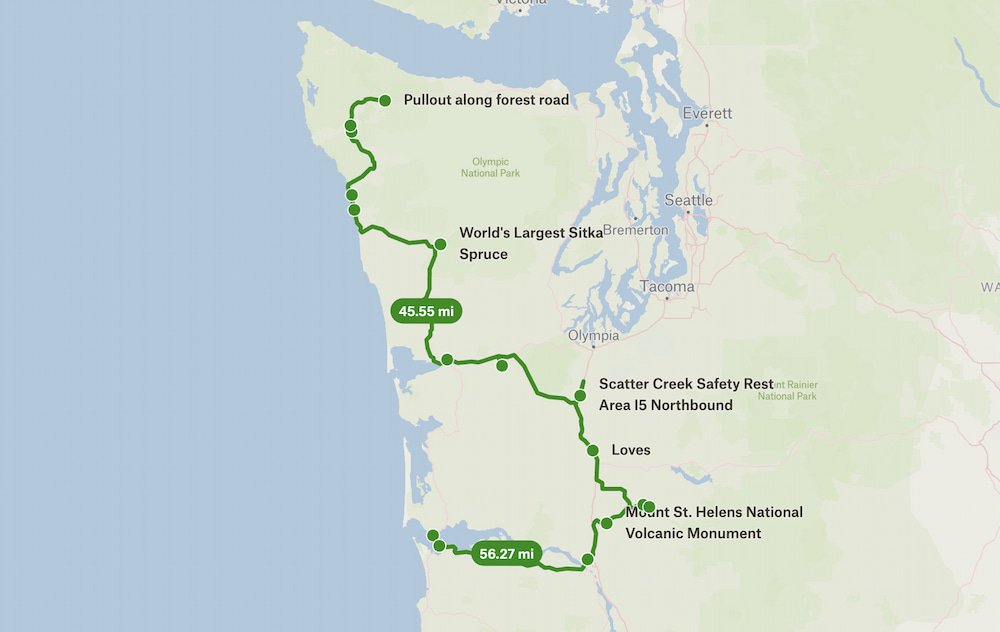Happy 100 days on the road to us! And how did we celebrate? By having an argument, over something really dumb that exploded because we were both feeling testy. We don't tend to fight much, but after being together every. single. day. it's something unsurprising that could happen?! A friend asked us recently if we had gotten to the point where one or both of us needed some space from the other on this trip. We haven't, but we suppose having a spat is the closest to getting to that point!

Longview: Squirrel Crossings and Where Washington Was Born
We drove away from our beautiful overnight spot alongside the Pacific Ocean, going a bit inland to the town of Longview in Washington, where we saw the Nutty Narrows Bridge, built in 1963 so that squirrels could safely cross the road on a bridge tied to trees above oncoming traffic. Apparently squirrel parents to this day teach their young to use the bridge (random trivia: did you know that a baby squirrel is called a kit? Now we both do). This idea has spawned other squirrel bridges, with 9 additional crossings in Longview.
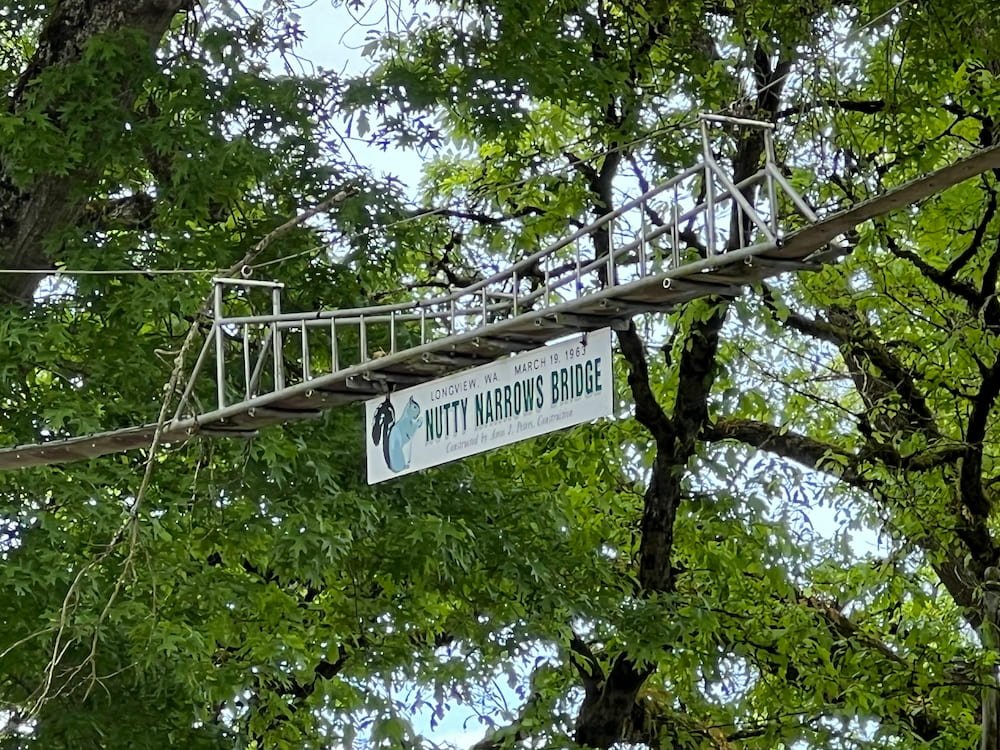
Not far from the squirrel bridge, there's an remodeled old train, as well as a marker for the Monticello Convention, which commemorates the site where Oregon residents petitioned to create a new territory, and a portion of this became Washington state. In 1848, Oregon was much bigger, and over the years the states of Washington, Idaho, Montana and Wyoming were created.
Volcanoes and Bigfoot
Because we were having an argument, Lisette and Sheila went for a long walk, so it was several hours later that we continued on and arrived at the base of Mount St. Helens, to a souvenir shop called North Fork Survivors. Back in 1980, Mount St. Helens erupted, and to this day is considered one of the most disastrous volcano eruptions in US history, killing 57 people. Outside of this souvenir shop there are vehicles and that were casualties of the volcanic eruption, as well as a giant Bigfoot sculpture.

Inside the shop, there's are several alleged Bigfoot footprint casts, numerous newspaper clippings about eyewitness Bigfoot sightings, and a ton of memorabilia. We talked briefly to the owner, and she and her husband are ardent believers in Bigfoot, having apparently seen it wandering in the area a few times. Do you believe in Bigfoot?



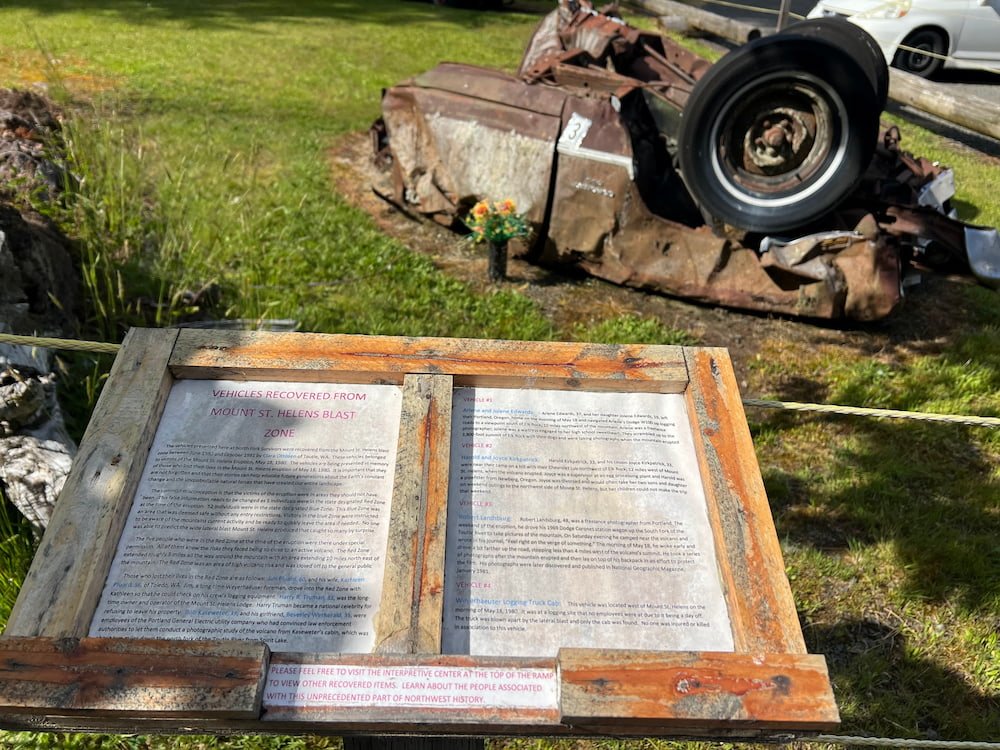
We learned that it was quite difficult to get around and up Mount St. Helens due to numerous road closures and driving some roads in our RV, so we figured we'd explore other parts of Washington state in more detail.

A Failed Nuclear Site
Did you know that Washington has a failed nuclear site? The next morning we visited Washington Nuclear Project Nos. 3 and 5 (called WNP-3 and WNP-5 or the Satsop Nuclear Power Plant), 2 of the 5 nuclear power plants that were commenced in 1977. Construction stopped in 1983 due to funding issues. Today, the power plant structures tower high into the sky, but are simply shells that you can see inside of, with no infrastructure within the thick cement walls.


Apparently Satsop Nuclear Power Plant is a business park and filming location today, but the area looked pretty abandoned to us, with not a single worker in sight. It was bright and sunny when we were there, but we could imagine that it could feel like quite an eerie feel on a grey and somber day.
In Memory of Kurt Cobain
About 30 minutes away, we arrived at the city of Aberdeen. Nirvana fans will associate it with its lead singer, guitarist and main songwriter, Kurt Cobain, who grew up here. The Kurt Cobain Memorial Park is a small spot dedicated to his memory, including a bench, board with his picture on it, sculpture of an electric guitar, and rather humorously, an apparent sculpture of his air guitar. The surrounding area is residential so there's not a lot to do here, although it was clear that some of the immediate neighbors were probably often inundated with visitors, so had clear signs wanting to be left alone!


Olympic National Park and The Tallest Trees
In the afternoon, we arrived at Olympic National Park, which encompasses over a million acres, with countless mossy trees, old-growth forests, and undisputedly all sorts of animals dwelling within this area. There are also some beautiful bright yellow flowers that line the roads, which we thought looked incredible, but we later found out were Scotch Broom, a noxious weed on Washington state's quarantine list that displaces native and beneficial plants, with seeds that are toxic to livestock and horses! In the Quinault Rainforest of Olympic National Park we saw the world's tallest Sitka Spruce tree, which clearly stood heads and shoulders (or should we say, branches and leaves?) above the others surrounding it, at 58 meters (191 feet) tall and 16 meters (55 feet) wide--so tall there was absolutely no chance of getting a photo of the entire tree. It's not even the tallest tree in the state: that accolade goes to the Nolan Creek Cedar, at 178 feet tall!
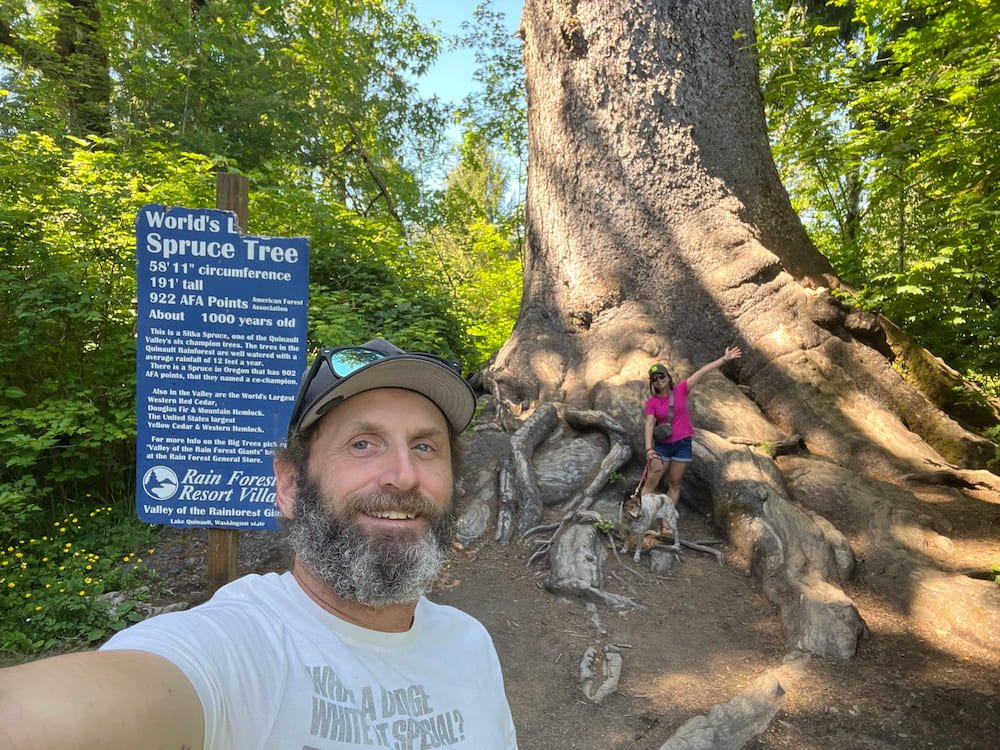

Arriving back on the Pacific coast, we were happy to walk barefoot along Kalaloch Beach, visiting the Tree of Life, a well-known Sitka spruce tree that's precariously perched on the edge of a cliff, its roots dangling above the cliff so that we had to walk gingerly around it. Within the alcove, people have left rocks and messages, creating a peaceful sort of ambience inside, particularly as the sunlight seeped above us.



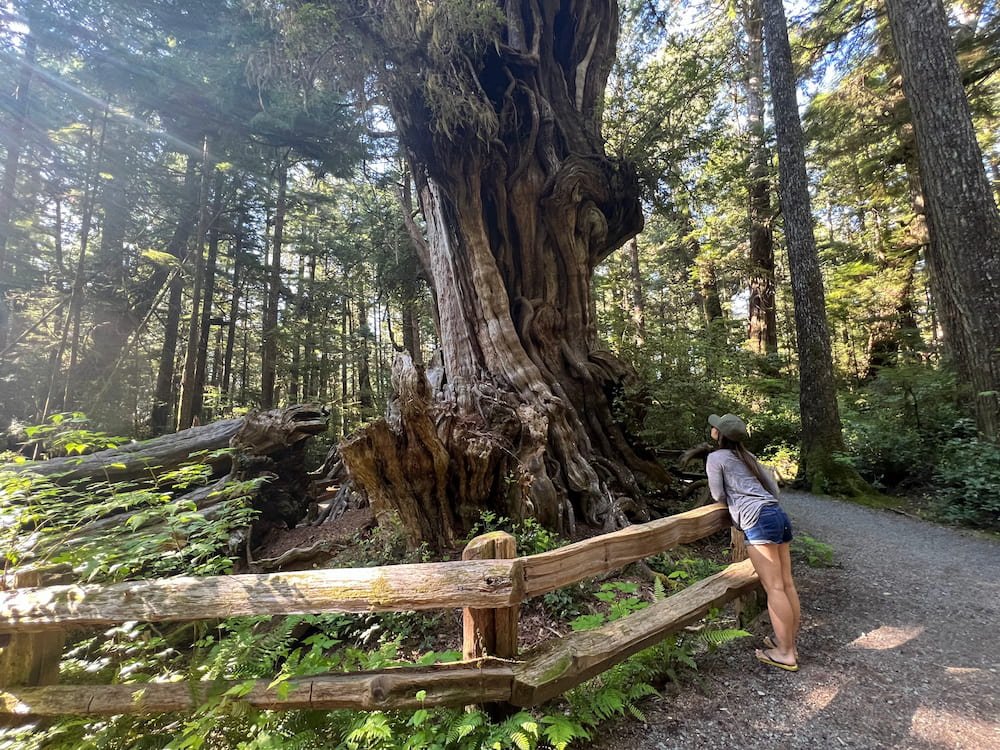
We walked around more short trails, continuously craning our necks to look up at the tall Douglas fir, Sitka spruce, and cedar trees. We can definitely understand why Japanese forest bathing has become so popular in recent years, and how immersing oneself in forests can provide therapeutic and relaxing benefits! Looking up toward the sky and seeing all the trees' branches and leaves above not only makes for a spectacular photo, but is definitely very soothing.
For Forks Sake
After getting a decent dose of forest bathing, we continued to the city of Forks, still on Washington's Olympic Peninsula. We parked outside the Forks Timber Museum, created in 1984 to celebrate Forks' history as the self-proclaimed “Logging Capital of the World." The museum was unfortunately was closed by the time we arrived, but had some fun sculptures outside, including two lumberjacks sawing a log that said "Forks Timber Museum" on the saw, a Bigfoot creature and an old pay phone booth, and some vintage cars. There is also a trail to the side of the Museum, in case anyone wants to head back into the forest!


John's Beachcombing Museum
Our last stop at the quaint city of Forks (besides a brief grocery stop) was John's Beachcombing Museum, created by one man who started to collect items that he'd found washed up on the beach in the 1970's. It's pretty incredible to see how extensive the collection is--there are enough buoys and floats for them to have been built into their own totem pole-like sculptures! Apparently there 's also everything from a mammoth tooth to a book of letters washed up from the 2011 tsunami in Japan. The museum is only open from June to September, so we were early in the summer season, but we spoke briefly to a lady (John's partner?) who was happy for us to take a few photos.


That evening, we returned to the forest, driving into the forest off the main road. While there were areas to pull off on this narrow road, they were fairly small for our RV, so we decided to turn around and park closer to the entrance where there was a more generous-sized spot. Michael asked Lisette to get out of the RV to help him make a U-Turn, only for Lisette to look out the window and see... BEAR TRACKS! Of course, we are in their home, but the tracks were irrefutable, leading Lisette to staunchly refuse to get out of the RV (ah, heck no!). Once we pulled up to our desired spot closer to the main road, we did hear gunshots in the distance, indicating that there were likely hunters still out before the sun fully set, and the pitch black of the night fully entrenched itself in the forest.
Route Map
